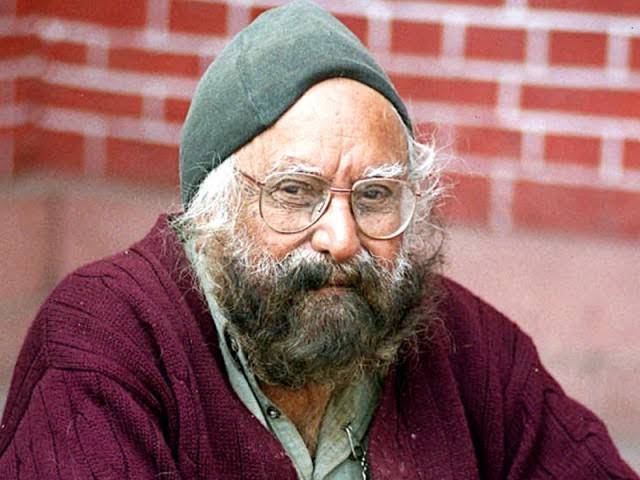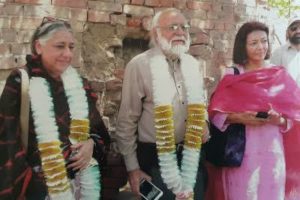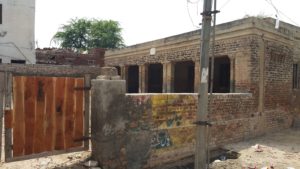
As the Kartarpur Corridor opened floodgates of people from across the border in Indian Punjab, who had dreamt of visiting the site, I was reminded of those that couldn’t make it to the Sikh shrine or sites that they revered. Watching the people dance with joy, I was reminded of Kushwant Singh, who died five years ago at the age of 99 with longing for his birthplace, the heveli at Hadali, Khushab which fell on Pakistan’s side of Punjab. Indeed, the wounds of partition remain alive that can only be soothed through connectivity and talking to each other.
“Give my love to everyone in Hadali. Tell them, if it was possible, I would like to be buried in Hadali”, Khushwant Singh wrote to Ali Asad Bhatti, a little-known Hadali-born Punjabi poet and a retired soldier. Kushwant Singh’s love for his birth place that he had to abandon due to partition is indeed documented in his “Letters to Hadali.” The correspondence between Khushwant Singh and Asad Bhatti reportedly started in 1990 when the latter first wrote to the writer.

Bhatti had dispatched his first letter without any address. It was simply marked Khushwant Singh, Delhi, India – no house number, no street, no locality, no post code. He did not have very high expectations, but to his surprise and delight, he received a reply within a month. This started a friendship through letters which lasted until the very end of Khushwant Singh’s life, though the number didn’t go beyond a handful. Asad Ali Bhatti wrote in Urdu and Khushwant Singh responded in English. The latter’s excuse was that not having written in Urdu for decades, he had run out of practice.
But what they communicated about was their common love for the place they belonged to. Singh remembered the place as a ‘tiny hamlet lost in sand and mud’, and thus was surprised to read Bhatti refer to it as ‘shehr’ (town). In one of his letters, he equated his birth place as having the same significance for him personally as Kaaba for the Muslims. The only time he visited Hadali in 1986 he wrote “coming here has given me the same pleasure which a Muslim gets after Haj or Umra”.
After years of correspondence, Singh and Bhatti finally met in 2003. The meeting indeed was very dramatic. The Pakistani poet from Hadali had travelled to India to attend a literary event in Chandigarh. He managed to contact Singh through help from the event organisers in Kasauli where he used to spend his summer. When Asad finally called him, something unexpected happened.

As soon as he introduced himself and told him that he had come from Hadali, first there was a complete silence and then Khushwant Singh hung up.
Asad was hurt and deeply embarrassed in front of fellow participants as a person whom he claimed to be his friend, did not bother even to talk to him. For the next few hours, Asad Bhatti remained dejected. In the evening, the shadow of gloom was lifted and it brightened up all of a sudden to the surprise of everyone: Khushwant Singh drove all the way from Kasauli and reached the hotel, the venue of that conference and asked for Asad Bhatti. As soon as he saw Asad, he hugged him tightly with tears in his eyes and said "Bhatti you must have been hurt that I cut your phone and did not talk to you. Actually, when I heard that you came from Hadali, I could not control myself."
He thought about being buried in a Hadali graveyard that could not happen. However, a portion of his ashes was brought to Hadali and mixed with the cement holding his memorial plaque outside the main hall of the local school where he studied in his childhood.
“My eyes filled with tears of gratitude to know my fellow villagers had shown so much affection for me. I will now die a happy man and wish I was buried in a Hadali graveyard”, Khushwant Singh wrote to Bhatti in a letter. “I can’t tell you what joy it gave me to read your letter and see the photographs of the signboard put outside the haveli in which I was born 90 years ago”, he adds.
Indeed, he desired to do more to keep connected to his birth place in Khushab. There was also an idea of setting up a museum at his birthplace with a plaque in his name to which he promised to contribute. He was aware of an earlier plan ran into snags. But when subsequently a plaque was placed in his name outside his house, Asad Ali Batti sent him the photographs. An overjoyed Singh shared the pictures with his family and friends.
To his fellow Hadalian, Asad Ali Bhatti, he promised to deliver most of his 100 books including translation from Urdu Iqbal's Shikwa and Jawab-e-Shikwa. It is not known if those books ever got to the poet but what is for sure is that Khushwant Singh’s soul must be smiling today to see people cross the border for contentment of their soul.
“Give my love to everyone in Hadali. Tell them, if it was possible, I would like to be buried in Hadali”, Khushwant Singh wrote to Ali Asad Bhatti, a little-known Hadali-born Punjabi poet and a retired soldier. Kushwant Singh’s love for his birth place that he had to abandon due to partition is indeed documented in his “Letters to Hadali.” The correspondence between Khushwant Singh and Asad Bhatti reportedly started in 1990 when the latter first wrote to the writer.

Bhatti had dispatched his first letter without any address. It was simply marked Khushwant Singh, Delhi, India – no house number, no street, no locality, no post code. He did not have very high expectations, but to his surprise and delight, he received a reply within a month. This started a friendship through letters which lasted until the very end of Khushwant Singh’s life, though the number didn’t go beyond a handful. Asad Ali Bhatti wrote in Urdu and Khushwant Singh responded in English. The latter’s excuse was that not having written in Urdu for decades, he had run out of practice.
But what they communicated about was their common love for the place they belonged to. Singh remembered the place as a ‘tiny hamlet lost in sand and mud’, and thus was surprised to read Bhatti refer to it as ‘shehr’ (town). In one of his letters, he equated his birth place as having the same significance for him personally as Kaaba for the Muslims. The only time he visited Hadali in 1986 he wrote “coming here has given me the same pleasure which a Muslim gets after Haj or Umra”.
After years of correspondence, Singh and Bhatti finally met in 2003. The meeting indeed was very dramatic. The Pakistani poet from Hadali had travelled to India to attend a literary event in Chandigarh. He managed to contact Singh through help from the event organisers in Kasauli where he used to spend his summer. When Asad finally called him, something unexpected happened.

Khushwant Singh's home in Hadali
As soon as he introduced himself and told him that he had come from Hadali, first there was a complete silence and then Khushwant Singh hung up.
Asad was hurt and deeply embarrassed in front of fellow participants as a person whom he claimed to be his friend, did not bother even to talk to him. For the next few hours, Asad Bhatti remained dejected. In the evening, the shadow of gloom was lifted and it brightened up all of a sudden to the surprise of everyone: Khushwant Singh drove all the way from Kasauli and reached the hotel, the venue of that conference and asked for Asad Bhatti. As soon as he saw Asad, he hugged him tightly with tears in his eyes and said "Bhatti you must have been hurt that I cut your phone and did not talk to you. Actually, when I heard that you came from Hadali, I could not control myself."
He thought about being buried in a Hadali graveyard that could not happen. However, a portion of his ashes was brought to Hadali and mixed with the cement holding his memorial plaque outside the main hall of the local school where he studied in his childhood.
“My eyes filled with tears of gratitude to know my fellow villagers had shown so much affection for me. I will now die a happy man and wish I was buried in a Hadali graveyard”, Khushwant Singh wrote to Bhatti in a letter. “I can’t tell you what joy it gave me to read your letter and see the photographs of the signboard put outside the haveli in which I was born 90 years ago”, he adds.
Indeed, he desired to do more to keep connected to his birth place in Khushab. There was also an idea of setting up a museum at his birthplace with a plaque in his name to which he promised to contribute. He was aware of an earlier plan ran into snags. But when subsequently a plaque was placed in his name outside his house, Asad Ali Batti sent him the photographs. An overjoyed Singh shared the pictures with his family and friends.
To his fellow Hadalian, Asad Ali Bhatti, he promised to deliver most of his 100 books including translation from Urdu Iqbal's Shikwa and Jawab-e-Shikwa. It is not known if those books ever got to the poet but what is for sure is that Khushwant Singh’s soul must be smiling today to see people cross the border for contentment of their soul.
